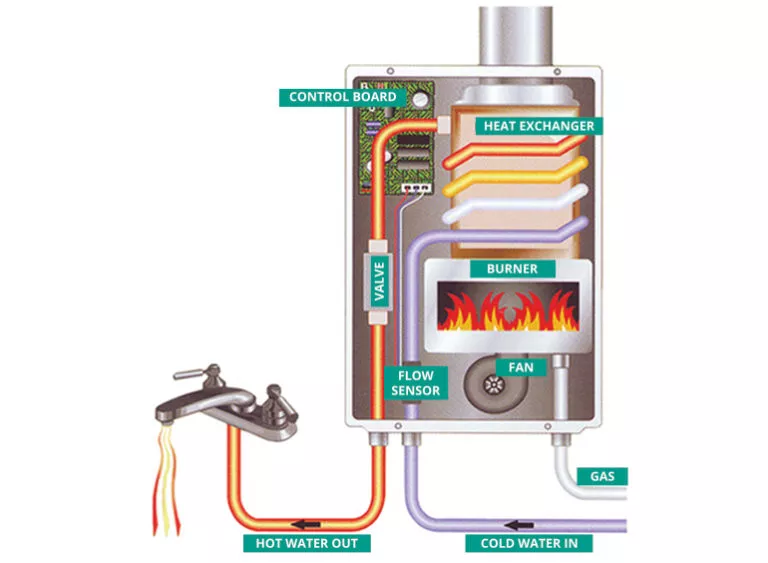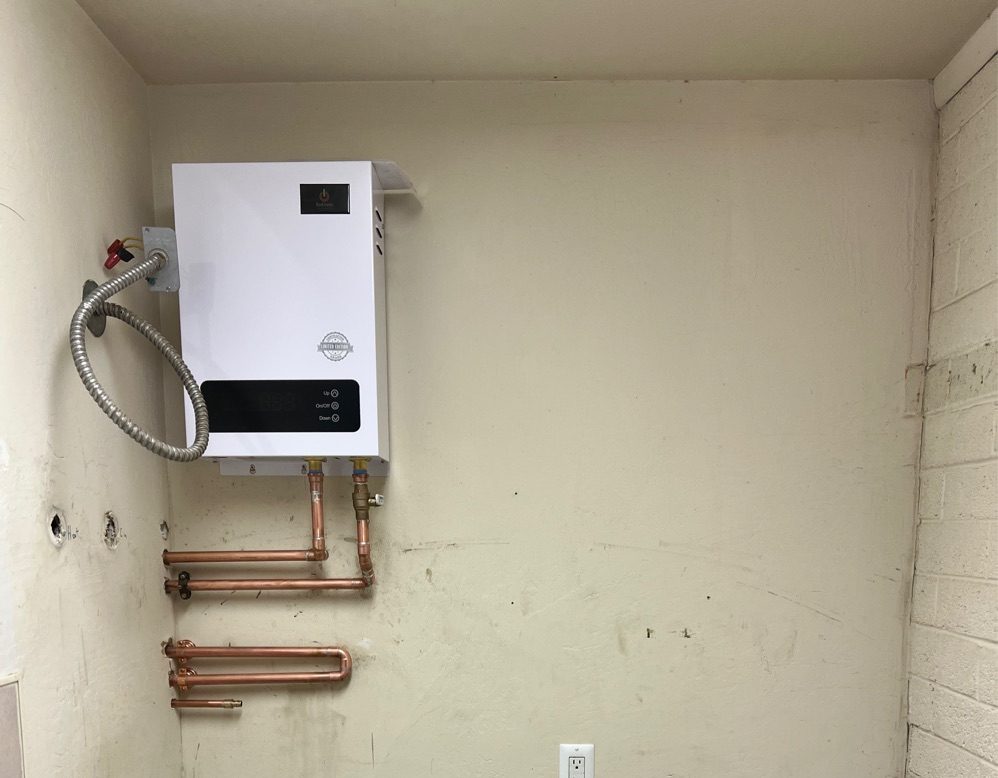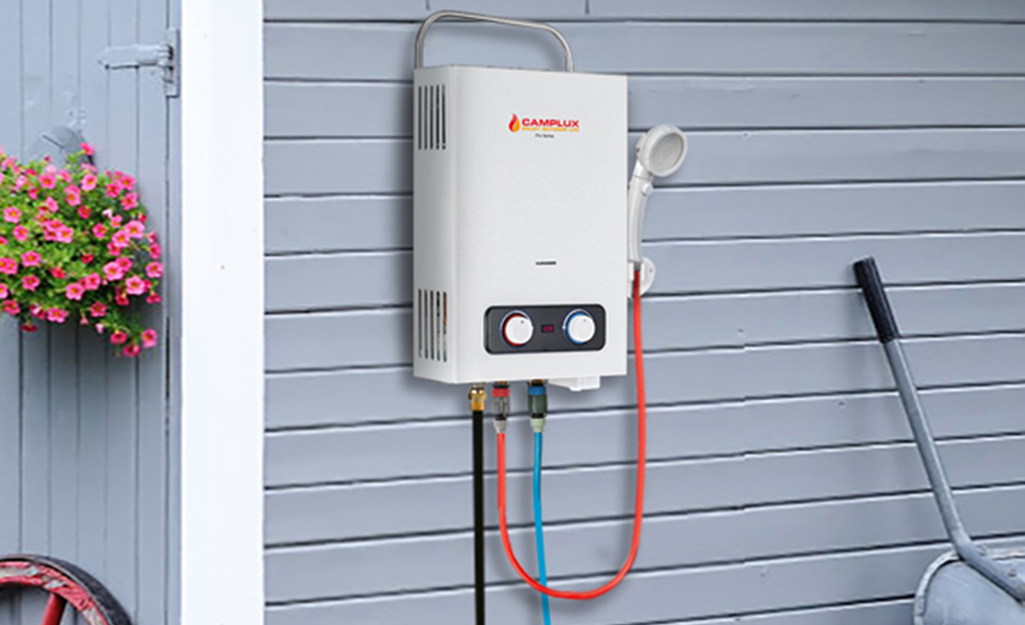Tankless Water Heaters Demystified: Everything You Need to Know
Tankless Water Heaters: The Ultimate Guide for Homeowners

Tankless water heaters deliver endless hot water while saving energy and space. This comprehensive guide helps you understand the technology, compare your options, and make the right choice for your home’s hot water needs.
Key Considerations at a Glance
| Feature | Gas Tankless | Electric Tankless |
|---|---|---|
| Upfront Cost | $1,500 – $3,500 | $800 – $2,000 |
| Operating Cost | Lower (natural gas) | Higher (electricity) |
| Max Flow Rate | 8-12 GPM | 2-6 GPM |
Source Notes: Cost and performance are estimates. Consult a professional for an exact quote.
How Do Tankless Water Heaters Actually Work?

Unlike traditional water heaters that store heated water in a tank, tankless water heaters work on-demand. When you turn on a hot water tap, cold water flows through the unit’s heat exchanger where it’s instantly heated by either a gas burner or electric heating elements.
This “on-demand” heating process eliminates the energy waste that occurs with traditional tank heaters, which constantly reheat stored water even when you’re not using it. The key to energy savings lies in this fundamental difference: tankless heaters only heat water when you need it.
The process happens in seconds. A flow sensor detects water movement, triggers the heating system, and delivers hot water at your desired temperature. When you stop using hot water, the system shuts off automatically.
Gas vs. Electric: Choosing the Right Type for Your Home

Gas Tankless Water Heaters
Best for high-demand households with existing gas lines. Faster heating and lower operating costs.

Electric Tankless Water Heaters
Perfect for smaller homes, apartments, or point-of-use applications. Easier installation but higher operating costs.
Interactive Heater Comparison Matrix
| Feature | Gas Tankless | Electric Tankless | Condensing Gas |
|---|---|---|---|
| Initial Cost | $1,500 – $3,500 | $800 – $2,000 | $2,500 – $4,500 |
| Flow Rate (GPM) | 8 – 12 | 2 – 6 | 10 – 15 |
| Energy Efficiency | 80-85% | 95-98% | 90-96% |
| Best For | Large families | Small homes/apartments | Maximum efficiency |
| Installation Complexity | Moderate to High | Low to Moderate | High |
Key Factors to Consider Before You Buy
Sizing: Flow Rate (GPM) & Temperature Rise Explained
Flow rate, measured in Gallons Per Minute (GPM), determines how much hot water your tankless heater can deliver simultaneously. A typical shower uses 2-3 GPM, while a dishwasher uses about 1.5 GPM.
Temperature rise is the difference between your incoming cold water temperature and your desired hot water temperature. In colder climates, this difference can be 70°F or more, requiring a more powerful unit.
Venting Requirements for Gas Models

Gas tankless water heaters require proper venting to safely remove combustion gases. Most units need either direct vent (sealed combustion) or power vent systems. The venting requirements significantly impact installation costs and complexity.
Electrical Requirements for Electric Models
Electric tankless heaters require substantial electrical power, often needing 100-200 amp service panels and dedicated high-amperage circuits. A whole-house electric unit might need three 40-amp breakers, requiring electrical upgrades in many homes.
Upfront Cost vs. Long-Term Energy Savings
While tankless heaters cost more upfront, they can save 20-30% on water heating costs annually. The Department of Energy estimates savings of $100-$200 per year for typical households through comprehensive energy efficiency measures including tankless water heaters.
Hear From Homeowners (2025)
“We upgraded to a gas tankless heater last spring and love having endless hot water. No more rushing through showers when the kids have used up all the hot water!”
“Our electric tankless unit was perfect for our small condo. Installation was straightforward and our energy bills dropped noticeably within the first month.”
“Best home upgrade we’ve made! The space savings in our utility room was huge, and we’ve saved over $150 on our annual water heating costs.”
Testimonials are editorially collected user experiences, 2025.
How Tankless Water Heaters Work
Common Myths & Misconceptions
:max_bytes(150000):strip_icc()/tankless-hot-water-system-in-the-basement-of-a-green-technology-home-529577258-77afda16fd494c6899a78000888c3204.jpg)
Some believe tankless heaters deliver cold water between hot water uses.
Modern tankless heaters have improved significantly. Quality units with buffer tanks or recirculation systems eliminate this issue entirely.
The misconception that tankless heaters can’t supply enough hot water for large households.
Properly sized gas tankless units can deliver 8-12+ GPM, easily handling multiple simultaneous uses in large homes.
Some think tankless heaters are completely maintenance-free.
Annual maintenance is recommended, especially descaling in hard water areas. However, they still require less maintenance than traditional tank heaters.

Frequently Asked Questions
Tankless water heaters typically last 15-20 years, compared to 8-12 years for traditional tank heaters. With proper maintenance, some units can exceed 20 years of reliable service. The longer lifespan is due to their design – they don’t store water, which eliminates the corrosion issues that plague tank heaters.
Yes, annual maintenance is recommended, especially in areas with hard water. This includes descaling to remove mineral buildup and checking venting systems for gas models. Professional maintenance typically costs $100-$200 annually but helps ensure optimal performance and extends the unit’s lifespan.
Professional installation is strongly recommended. Gas models require proper venting and gas line work, while electric models need dedicated high-amperage circuits. Incorrect installation can be dangerous and void warranties. Most manufacturers require professional installation to maintain warranty coverage.
Modern tankless heaters are relatively quiet during operation. Gas models produce some noise from the burner and fan, similar to a small furnace. Electric models are virtually silent. The noise level is typically much less disruptive than the rumbling and popping sounds common with aging tank heaters.
Energy savings vary by household, but most homeowners see 20-30% reduction in water heating costs. For a typical family spending $400-600 annually on water heating, this translates to $80-180 in annual savings. Gas tankless heaters typically offer greater savings than electric models due to lower fuel costs.
Ready to Make an Informed Decision?
You now have the knowledge to choose the right tankless water heater for your home. Whether you select gas or electric, proper sizing and professional installation will ensure years of reliable, efficient hot water service.

